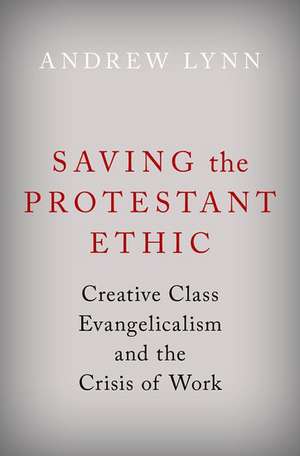Saving the Protestant Ethic: Creative Class Evangelicalism and the Crisis of Work
Autor Andrew Lynnen Limba Engleză Hardback – 6 iul 2023
Preț: 159.13 lei
Preț vechi: 180.06 lei
-12% Nou
Puncte Express: 239
Preț estimativ în valută:
30.46€ • 33.10$ • 25.60£
30.46€ • 33.10$ • 25.60£
Carte disponibilă
Livrare economică 20-26 martie
Livrare express 14-20 martie pentru 55.67 lei
Preluare comenzi: 021 569.72.76
Specificații
ISBN-13: 9780190066680
ISBN-10: 0190066687
Pagini: 360
Ilustrații: 3 figures
Dimensiuni: 236 x 165 x 31 mm
Greutate: 0.64 kg
Editura: Oxford University Press
Colecția OUP USA
Locul publicării:New York, United States
ISBN-10: 0190066687
Pagini: 360
Ilustrații: 3 figures
Dimensiuni: 236 x 165 x 31 mm
Greutate: 0.64 kg
Editura: Oxford University Press
Colecția OUP USA
Locul publicării:New York, United States
Recenzii
In these days when almost everything about American evangelicalism is controversial, this well-researched, fair-minded book about the evangelical 'faith and work' movement is a welcome contribution. Andrew Lynn has provided a great deal for supporters of the movement, its critics, and all who worry about the moral malaise present in the marketplace to ponder.
The faith at work movement is an ongoing and evolving social movement, not a flash in the pan or a passing fad. Andrew Lynn brings us a strong contribution to the growing number of scholarly studies of the surprisingly diverse nature of the faith at work movement. Lynn's provocatively titled Saving the Protestant Ethic focuses on and brings us fresh insights into the conservative evangelical Protestant wing of the movement, whose search for meaning and purpose drives their economic activity.
This brief summary surely fails to capture the depth and breadth of Lynn's extraordinary descriptive project. He does a masterful job of separating the different theological threads that are woven together by the faith and work movement and contextualizing them in socioeconomic terms. Adherents of re-integrating theology will find the portrait of themselves and their views recognizable...What Lynn's book demonstrates above all is that the faith and work movement has not fallen far from the creative class tree...No one wants to go back to the fundamentalist work ethic. Everyone wants their Monday to matter to God.
This book represents an impressive achievement, drawing on a multidisciplinary array of deft ethnographic interviews, attentive participant observations, profound understanding of emic group discourse, impressive historical primary sources, nimbly enhanced and refined sociological theory, and quantitative analysis.
Saving the Protestant Ethic explores the faith and work movement within contemporary American Evangelicalism...Recommended. Upper-division undergraduates through faculty.
I highly recommend Andrew Lynn's work. Saving the Protestant Ethic is a first-rate study that will be essential reading for movement leaders and participants. It also serves as an enlightening resource for all who want to better understand America's largest religious constituency.
For those interested in the relationship between evangelicals and money, economics, and work in the last century, this work is essential. And though the faith and work movement is less well known than the prosperity and social gospels because it blends in with broader evangelical trends, this means that anyone who wants to understand the last century of evangelicals should understand this movement, and Lynn's work is an excellent resource to do just that.
The faith at work movement is an ongoing and evolving social movement, not a flash in the pan or a passing fad. Andrew Lynn brings us a strong contribution to the growing number of scholarly studies of the surprisingly diverse nature of the faith at work movement. Lynn's provocatively titled Saving the Protestant Ethic focuses on and brings us fresh insights into the conservative evangelical Protestant wing of the movement, whose search for meaning and purpose drives their economic activity.
This brief summary surely fails to capture the depth and breadth of Lynn's extraordinary descriptive project. He does a masterful job of separating the different theological threads that are woven together by the faith and work movement and contextualizing them in socioeconomic terms. Adherents of re-integrating theology will find the portrait of themselves and their views recognizable...What Lynn's book demonstrates above all is that the faith and work movement has not fallen far from the creative class tree...No one wants to go back to the fundamentalist work ethic. Everyone wants their Monday to matter to God.
This book represents an impressive achievement, drawing on a multidisciplinary array of deft ethnographic interviews, attentive participant observations, profound understanding of emic group discourse, impressive historical primary sources, nimbly enhanced and refined sociological theory, and quantitative analysis.
Saving the Protestant Ethic explores the faith and work movement within contemporary American Evangelicalism...Recommended. Upper-division undergraduates through faculty.
I highly recommend Andrew Lynn's work. Saving the Protestant Ethic is a first-rate study that will be essential reading for movement leaders and participants. It also serves as an enlightening resource for all who want to better understand America's largest religious constituency.
For those interested in the relationship between evangelicals and money, economics, and work in the last century, this work is essential. And though the faith and work movement is less well known than the prosperity and social gospels because it blends in with broader evangelical trends, this means that anyone who wants to understand the last century of evangelicals should understand this movement, and Lynn's work is an excellent resource to do just that.
Notă biografică
Andrew Lynn is a Postdoctoral Fellow at the Institute for Advanced Studies in Culture at the University of Virginia. His work spans organizational theory, religious studies, and the history of ideas surrounding ethics and economics. He received a PhD in Sociology from the University of Virginia.
